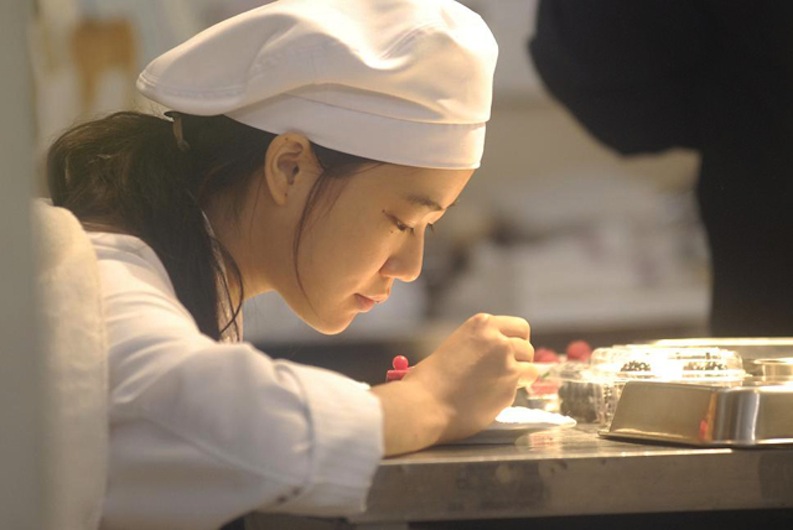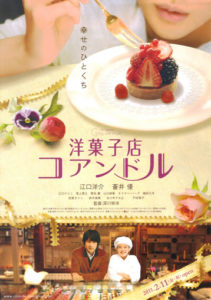[stextbox id=”grey” caption=”Patisserie Coin de Rue (2011)” float=”true” align=”right” width=”200″]
Director: Yoshihiro Fukagawa
Runtime: 115 minutes
Starring: Yu Aoi, Keiko Toda, Yosuke Eguchi, Noriko Eguchi
Country: Japan
Rating: Worth a Look (?)
More info
[/stextbox]
Japan loves its food. If there was any doubt of this, it was confirmed when the revered Michelin Guide published its ratings this year. There are now 29 three-star restaurants throughout the country, and 296 stars across establishments throughout Japan. While the über-cool fashion and tech of the country was once the subject of countless tomes, a single visit to the country will make it very clear that “food porn” is rampant in every shop window display. This has been reflected in cinema over the last few years as well, from Jûzô Itami’s classic 1985 film Tampopo, through Naoko Ogigami’s Glasses and Mitsuhiro Mihara Flavor of Happiness. The latest serving comes from the prolific Yoshihiro Fukagawa (In His Chart), and is a mouth-watering affair indeed.
Country girl Natsume (Yu Aoi, FLOWERS) comes to Japan to find her boyfriend, who had moved there to work in the top-class “Patisserie Coin de Rue”. Refusing to leave until she finds her man, she convinces stern boss Yuriko (Keiko Toda, A Ghost of a Chance) to give her a shot, despite her cakes not being up to their standard. Inspired by the once-legendary and now retired and reclusive patissier Tomura (Yosuke Eguchi, Goemon), Natsume must contend with the gruff Mariko (Noriko Eguchi, We Can’t Change The World But, We Wanna Build a School in Cambodia) and her own self-doubt in order to bring about change in her life.
The first half of Patisserie Coin de Rue (洋菓子店コアンドル) is taken up with the misadventures of Natsume as she learns the basics of being a patissier. This isn’t exactly virgin territory for cinema, with many of the familiar motifs and character types from across this broad genre present and correct on the menu. It certainly helps that the food porn in this instance is delectable, with the focus solely on the cakes, pastries and sweets that serve as a universal language in the East and West. Sugary, moist and crispy things are all examined in loving detail by Fukagawa’s lens, so it is advisable that a decent meal is eaten in advance of any viewings. In these moments, the film almost works as a silent piece, as you could just as easily take away the sounds of the busy kitchen and enjoy the handiwork.
It isn’t all cakes and tea parties, as the gooey centre of the film is still a creamy emotional filling, the type that could just as easily curdle if left out too long. As such, there is a bit of restraint shown is this aspect of the narrative, although it still manages to hit all of the predictable buttons: lost love, a master overcoming a past tragedy, a fallen leader whose mantle must be taken up by the fresh young go-getter. Nothing is terribly surprising about Patisserie Coin de Rue except perhaps how well it manages to navigate the familiar.
Yu Aoi continues to grow as a screen presence, although very little about this film allows her to stretch as an actress. Indeed, there is often more humour and depth in some of Noriko Eguchi’s deadpan stares than there are in an entire feature of screeching lines. Similarly, Yosuke Eguchi’s understated performance balances out some of the more melodramatic elements to the film.
[stextbox id=”custom”]A familiar tale, albeit one with solid performances and beautiful close-up photography of the lovely treats on display. Enjoy with a warm beverage.[/stextbox]






